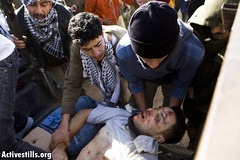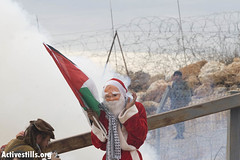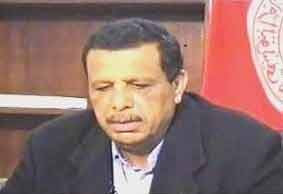
Originally uploaded by activestills
Arafat Hawadja, 20, is evacuated after he was injured from live ammunition shot by Israeli soldiers during a solidarity protest with the people in Gaza in the west bank village of Nilin. On the way to the hospital he died.
Photo by: Keren Manor/ Activestills.org
The rains of death in Gaza
Originally posted on http://a-mother-from-gaza.blogspot.com/
We woke up this morning to the news in Gaza. It seems we always wake up to news there- so its become a matter of perspective how bad the news is each time; how remote it seems each time; how real or not; how severe-and whether the severity warrants an "international outcry" or whether the animals can continue to fester in their cages for a while longer.
We received a call from my in-laws in Lebanon's Baalbeck refugee camp at an early hour, checking in on my family in Gaza, since they cannot call them directly. We call my parents. My father does not answer. We call his mobile- we reach him. He has just returned from Shifa hospital- we hold our breaths.
"We are OK. We went to donate blood and to see if they needed any help" says my father, a retired surgeon.
"I was out in the souk when the strikes began- I saw the missiles falling and prayed; the earth shook; the smoke rose; the ambulances screamed" he said, the sirens audible in the background. he was on talateeni street at the time of the attacks, just a few streets down from one of the attack sites.
My mother was in the Red Crescent Society clinic near the universities at the time of the initial wave of attacks, where she works part-time as a pediatrician. Behind the clinic was one of the police centers that was leveled. She said she broke down at first, the sheer proximity of the attacks having shaken her from the inside out. After she got a hold of herself, they took to treating injured victims of the attack, before they transferred them to Shifa hospital.
There, she said, medical supplies were in short supply: face masks, surgical gloves, gowns...
My parents live in the the city center, and the Israeli war planes attacked people and locations all around them. Over 50 "targets"by 60 warplanes, read the headlines in Haaretz. And over 220 killed- in broad daylight; in the after-school rush.
Like a movie tagline. Or a game. If you say it enough times, it does not sound real anymore: 50 targets, 60 warplanes, 200 people, 1 day.
All very sanitary. Very sleek. Neatly packaged: war in a gift-box.
"There is a funeral passing every minute. The bodies are piling up." Gaza's air is saturated with the smell of burning human flesh. There is panic, as one would imagine dogs would panic in an overcrowded cell when several of their own are violently, abruptly killed. But dead dogs-in a cage, no less, would create an outcry.
The rains of death continue to fall in Gaza. And silently, we watch. and silently, governments plotted: how shall we make the thunder and clouds rain death onto Gaza? Egypt; the United States; Israel...
And it will all seem, in the end of the day, that they are somehow a response to something. As though the situation were not only acceptable- but normal, stable, in the period prior to whatever this is a response to. As though settlements did not continue to expand; walls did not continue to extend and choke lands and lives; families and friends were not dislocated; life was not paralyzed; people were not exterminated; borders were not sealed and food and light and fuel were in fair supply.
But it is the prisoners' burden to bear: they broke the conditions of their incarceration. They deviated. But nevertheless, there are concerns for the "humanitarian situation": as long as they do not starve, everything is ok. Replenish the wheat stocks immediately.
The warden improves the living conditions now and then, in varying degrees of relatively, but the prison doors remain sealed. And so when there are 20 hours of power outages in a row, the prisoners wish that they were only 8; or 10; and dream of the days of 4.



 TUNIS – Trade unionists arrested and tortured. Protesters shot dead by police during demonstrations. Journalists in jail. And a great censorship to prevent the spread of protests and protect the international image of a country which was visited by 6.7 millions tourists just in 2007. We are speaking about Tunisia. A country which is also known for his emigration. Since many years, thousands of Tunisians cross the Mediterranean towards to the Italian islands of Lampedusa and Pantelleria. During the first half of 2008 some 1,287 Tunisian landed on the Italian shores. They look for a better life. But what do they leave behind? To understand what Tunisia has become, we visited one of its hottest regions. The mining area of Gafsa, 400 km southwest of Tunis. Here it started - ten months ago - the most important social movement of the Country during the last 20 years. A spontaneous and popular movement which keep on struggling despite the repression and censorship.
TUNIS – Trade unionists arrested and tortured. Protesters shot dead by police during demonstrations. Journalists in jail. And a great censorship to prevent the spread of protests and protect the international image of a country which was visited by 6.7 millions tourists just in 2007. We are speaking about Tunisia. A country which is also known for his emigration. Since many years, thousands of Tunisians cross the Mediterranean towards to the Italian islands of Lampedusa and Pantelleria. During the first half of 2008 some 1,287 Tunisian landed on the Italian shores. They look for a better life. But what do they leave behind? To understand what Tunisia has become, we visited one of its hottest regions. The mining area of Gafsa, 400 km southwest of Tunis. Here it started - ten months ago - the most important social movement of the Country during the last 20 years. A spontaneous and popular movement which keep on struggling despite the repression and censorship. The region of the mines looks like a lunar landscape. But under the grey mountains among Moularès, Redeyef, Mdhilla and Metlaoui there is a treasure: 600 millions tons of phosphate. The mines are held by the public Phosphate company of Gafsa (CPG). In 2008 the price of a ton of phosphate rock has doubled because of the growing demand of fertilizers in China and India. Tunisia is the fifth producer in the world and has still reserves for the next 100 years. Yet the region of Gafsa is one of the poorest. The technical modernization of mining reduced by 55% the number of employees in the past 20 years, from 11,000 to 5,000. And it caused a serious economic crisis in the towns of miners, built from scratch during the French colonization to house the workforce in the early twentieth century. Today, unemployment affects 40% of young people. Young people who often have no other way out except burning the borders, as they say in Arabic.
The region of the mines looks like a lunar landscape. But under the grey mountains among Moularès, Redeyef, Mdhilla and Metlaoui there is a treasure: 600 millions tons of phosphate. The mines are held by the public Phosphate company of Gafsa (CPG). In 2008 the price of a ton of phosphate rock has doubled because of the growing demand of fertilizers in China and India. Tunisia is the fifth producer in the world and has still reserves for the next 100 years. Yet the region of Gafsa is one of the poorest. The technical modernization of mining reduced by 55% the number of employees in the past 20 years, from 11,000 to 5,000. And it caused a serious economic crisis in the towns of miners, built from scratch during the French colonization to house the workforce in the early twentieth century. Today, unemployment affects 40% of young people. Young people who often have no other way out except burning the borders, as they say in Arabic.  Reinforcements were sent from Tunis to the mining area. Police checked all the accesses to Redeyef. And plainclothes agents monitored the main actors of the protest. On June 6, police opened fire on a demonstration. A guy, Hafnaoui Maghzaoui, was shot dead. And 27 people were injured. One of them, Abdelkhaleq Aamidi, died after three month in hospital, on September 14. Within a few weeks, two hundred people were arrested. Trade unionists as well as ordinary people. The night between June 21 and 22 the leader of the protest Adnan Hajji was arrested again.
Reinforcements were sent from Tunis to the mining area. Police checked all the accesses to Redeyef. And plainclothes agents monitored the main actors of the protest. On June 6, police opened fire on a demonstration. A guy, Hafnaoui Maghzaoui, was shot dead. And 27 people were injured. One of them, Abdelkhaleq Aamidi, died after three month in hospital, on September 14. Within a few weeks, two hundred people were arrested. Trade unionists as well as ordinary people. The night between June 21 and 22 the leader of the protest Adnan Hajji was arrested again. The movement was beheaded. But no woman was arrested. And so the women, the wives of trade unionists and activists in jail, returned on the streets, on July 27, demanding the release of prisoners. Among them there was also Zakiya Dhifaoui. Born in 1966, she is journalist and teacher. She came from Kairouan to write a report on the opposition newspaper Muatinun. But her report will never be published. Because that day Dhifaoui was arrested. Her arrest was a message sent to all the Tunisian journalists: don’t come to Redeyef and don’t write about it. It is the other side of the repression: the censorship of any sensitive information. Dhifaoui was sentenced to four and a half months of prison. But she is not the only journalist in jail. Actually it is the freedom of expression itself to be judged.
The movement was beheaded. But no woman was arrested. And so the women, the wives of trade unionists and activists in jail, returned on the streets, on July 27, demanding the release of prisoners. Among them there was also Zakiya Dhifaoui. Born in 1966, she is journalist and teacher. She came from Kairouan to write a report on the opposition newspaper Muatinun. But her report will never be published. Because that day Dhifaoui was arrested. Her arrest was a message sent to all the Tunisian journalists: don’t come to Redeyef and don’t write about it. It is the other side of the repression: the censorship of any sensitive information. Dhifaoui was sentenced to four and a half months of prison. But she is not the only journalist in jail. Actually it is the freedom of expression itself to be judged.
 Without any doubt this is one of the greatest political trial under the presidency of Ben Ali . A presidency which has been lasting uninterrupted since 1987. In November 2009, there will be the presidential elections. The deaths of Redeyef will not be enough to undermine the power of the Constitutional Democratic Party (RDC). Nor to revive the opposition after years of repression of dissent. The defense lawyers know it, that the judgement has already been written. But in the history there is an accumulation... says one of them under anonymity. Actually the Tunisian poet Abou el Kacem Chebbi, told it a century ago: "When people choose life, fate must respond, night must brighten and chains must break".
Without any doubt this is one of the greatest political trial under the presidency of Ben Ali . A presidency which has been lasting uninterrupted since 1987. In November 2009, there will be the presidential elections. The deaths of Redeyef will not be enough to undermine the power of the Constitutional Democratic Party (RDC). Nor to revive the opposition after years of repression of dissent. The defense lawyers know it, that the judgement has already been written. But in the history there is an accumulation... says one of them under anonymity. Actually the Tunisian poet Abou el Kacem Chebbi, told it a century ago: "When people choose life, fate must respond, night must brighten and chains must break".

 Miguel Hidalgo Ejido, Chiapas. State and federal police shot and murdered six peasants from this ejido [communally owned land] in La Trinitaria county, which for almost a month has controlled the Chinkultic archaeological ruins, located three kilometers from the ejido.
Miguel Hidalgo Ejido, Chiapas. State and federal police shot and murdered six peasants from this ejido [communally owned land] in La Trinitaria county, which for almost a month has controlled the Chinkultic archaeological ruins, located three kilometers from the ejido.










